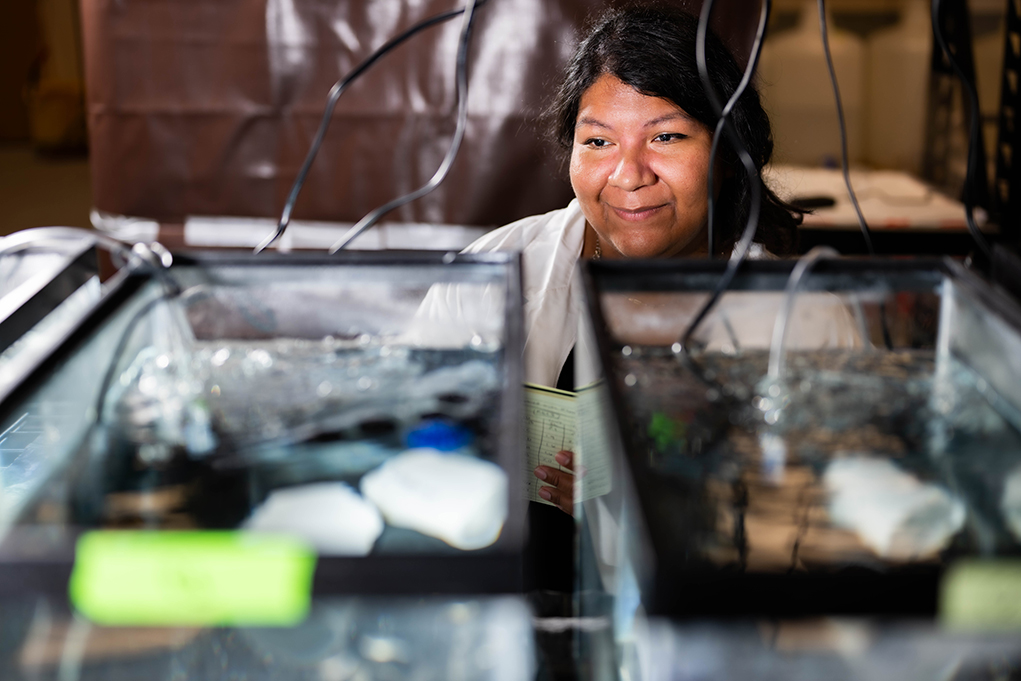Monday, April 14, 2025
The Texas Leadership Research Scholars Program, which debuted in Fall 2024, is a Texas Higher Education Coordinating Board research scholarship and leadership opportunity program for high-achieving graduate students with financial need.
University of North Texas is among only nine public universities in the state selected to participate in the inaugural cohort of the program, which awards selected doctoral researchers a nearly $18,000 scholarship renewable for up to four years.
“This program is not only bringing financial support for these doctoral researchers to continue their education, but also giving them access to a peer network and mentoring that will help set them up for career success after they graduate,” says Brenda Barrio, UNT assistant vice president for research and innovation.
A total of six UNT students were named in the first cohort of Texas Leadership Research Scholars — Garrett Cayce in the College of Engineering; Araceli Herrera Mondragon, Celeste Ortega-Rodriguez and Jose Robledo in the College of Science; Christian Quintero in the College of Education; and Emma Wimberg in the College of Music.
Read Ortega-Rodriguez’s story below and check back on this UNT Research webpage throughout Spring 2025 to learn more about students in the inaugural group of Texas Leadership Research Scholars.
Understanding Chemical Exposure Risks

Funding from the award will allows Ortega-Rodriguez to attend key research conferences, establish her identity as a scientist and network with colleagues without financial stress
Celeste Ortega-Rodriguez (’15) says she cried tears of joy with her family when she heard the news she had been selected as one of the inaugural Texas Leadership Research Scholars from UNT. The award allows her to focus on her education and research goals without the financial stress of how to fund those endeavors.
“The funding from this award has provided me with the financial ability to travel and attend research conferences that are crucial for helping me build on my identity as a scientist and to network and make connections with other colleagues within and outside of my field of study,” Ortega-Rodriguez says.
She first discovered her passion for research while completing her Honors College undergraduate thesis at UNT with her advisor, Mark Burleson, senior lecturer of biological sciences, and serving as a research volunteer in the ecotoxicology lab led by Aaron Roberts, associate vice president for research and innovation and professor of biological sciences. Currently pursuing her Ph.D. in biological sciences at UNT, she is back researching in Roberts’ lab.
“Celeste is a leader among her peers and the graduate student body at large,” Roberts says. “What I’ve been most impressed with is her drive to make sure that her research is impactful. Her work has implications for environmental and human health, and she has a real passion for ensuring that it translates to real-world results.”

UNT's College of Science doctoral student Celeste Ortega-Rodriguez conducting research in the lab
Ortega-Rodriguez studies the generational effects of pollutants on fish — specifically the neurobiology and behavior that environmental contaminants can have in offspring who weren’t exposed to the chemical, but whose parents were. The research has broader implications for understanding chemical exposure in humans.
The work is deeply personal to Ortega-Rodriguez, whose grandparents were farm workers who traveled across the U.S. with their children doing hard, manual labor for long hours. Her mother began working in the fields at 5 years old, carrying water to workers, digging up potatoes and picking cotton and other crops. She once told Ortega-Rodriguez about how the workers would get so thirsty they would drink water directly from the irrigation spouts. This was in the 1960s, when research was just coming out about the harmful effects of pesticides and herbicides being sprayed on crops.
“When I think about the kind of work that I want to do in environmental policy, I want part of it to be advocating for underserved populations who may be susceptible to environmental contamination — whether it’s due to language barriers, minimal education, low socioeconomic status or a lack of community support,” Ortega-Rodriguez says.
From UNT News – Research and Innovation by by Amanda Fuller